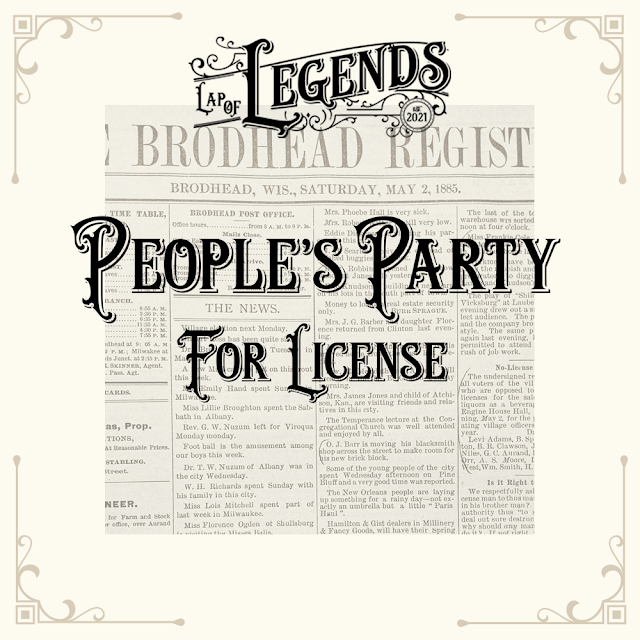People's Party - For License
Local Mayoral Race, National Politics
The Nuances
People's Party
"The conditions which surround us best justify our cooperation; we meet in the midst of a nation brought to the verge of moral, political, and material ruin. Corruption dominates the ballot-box, the Legislatures, the Congress, and touches even the ermine of the bench."
"From the same prolific womb of governmental injustice we breed the two great classes—tramps and millionaires. The national power to create money is appropriated to enrich bond-holders; a vast public debt payable in legal-tender currency has been funded into gold-bearing bonds, thereby adding millions to the burdens of the people."
"We have witnessed for more than a quarter of a century the struggles of the two great political parties for power and plunder, while grievous wrongs have been inflicted upon the suffering people. We charge that the controlling influences dominating both these parties have permitted the existing dreadful conditions to develop without serious effort to prevent or restrain them. Neither do they now promise us any substantial reform."
"We believe that the power of government—in other words, of the people—should be expanded (as in the case of the postal service) as rapidly and as far as the good sense of an intelligent people and the teaching of experience shall justify, to the end that oppression, injustice, and poverty shall eventually cease in the land. . . ."
For License
Sometimes the best way to help explain what an ideology stands for, is to share the counter ideal.
Below is a clipping from Brodhead's Register, published on May the 2nd, 1885:
"The undersigned respectfully request all voters of the village of Brodhead who are opposed to the granting of licenses for the sale of intoxication liquors as a beverage to meet at the Engine House Hall, on Saturday evening, May 2, for the purpose of nominating village officers for the ensuing year.
Dated May 1m 1885.
Levi Adams, B. Sprague, E. A. Charlton, B. R. Clawson, J. Thompson, F. E. Niles, G. C. Aurand, B. J. Gardener, J. G. Orr, A. S. Moore, L. S. Fisher, Geo. West, Wm. Smith, H. C. Putnam."
It is important to note the signature of B. Sprague ... who was editor and publisher of Brodhead's Independent Observer, as well as a prominent attorney. He also served as postmaster general for Brodhead, as well as an elected government official from local to State legislature.
Additionally, the paper goes on to question in the following column, "Is it Right to License?":
"We respectfully ask, Is it right to license man to thus mar the image of God in his brother man? Right to give him authority thus 'to sell insanity' and deal out sure destruction? If it is right why should any man be forbidden to do it? If not right, why should any be permitted? Why forbid all but 'men of sober life and conversation' to do it if it is right? Will the poison be less active or less fatal if it is dealt out with a steady hand? Will the buyer be the less a drunkard because the seller is a sober man? May this pollution be poured out upon society only by clean hands? can that which always works private evil conduce to public good? can that which is bad for all the parts be good for the whole? Can evil be converted into good by manipulation? Can wrong be legislated into right?"
"Licensed to make a strong man weak;
Licensed to lay the wise man low;
Licensed, a wife's fond heart to break,
And make her children's tears to flow.
Licensed to do thy neighbor harm;
Licensed to kindle hate and strife;
Licensed to nerve the robber's arm;
Licensed to whet the murderer's knife.
Licensed thy neighbor's purse drain,
And rob him of his very last;
Licensed to heat his feverish brain,
Till madness crown thy work at last,
Licensed where peace and quiet dwell
To bring disease, and want, and woe;
Licensed to make this world a hell,
And fit man for a hell below."




